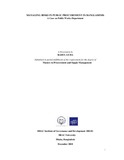| dc.contributor.advisor | Islam, Mohammad Sirajul | |
| dc.contributor.author | Guha, Rahul | |
| dc.date.accessioned | 2019-03-12T07:10:47Z | |
| dc.date.available | 2019-03-12T07:10:47Z | |
| dc.date.copyright | 2018 | |
| dc.date.issued | 2018-12 | |
| dc.identifier.other | ID 16382016 | |
| dc.identifier.uri | http://hdl.handle.net/10361/11553 | |
| dc.description | This dissertation is submitted in partial fulfillment of the requirements for the degree of Masters in Procurement and Supply Management, 2018. | en_US |
| dc.description | Cataloged from PDF version of dissertation. | |
| dc.description | Includes bibliographical references (pages 33-35). | |
| dc.description.abstract | Public procurement plays an important role in the socio-economic development of the
country. It spends public money to serve the people. To achieve the best product,
service or work from public investments, the procurement process must be managed
properly and made true competitive. Any type of mismanagement and inefficient
handling of procurement activities fails to deliver the expected benefits and damages
the reputation of a procurement agency. Therefore, it is imperative for undertaking
certain measures to avoid risks and reduce their negative effects in case of the
management of public procurement. Risk management enables action to be taken to
correct deficiencies and to avoid greater problems in future public procurement.
This research aims to examine the current procurement practices in Public Works
Department (PWD) and identify the associated risks in various stages of public
procurement cycle including bidding process, selection process of contractors,
implementation of procurement and financial management. A questionnaire survey
was administered to address the research objectives.
It is observed that PWD is complying with Public Procurement Act, 2006 and Public
Procurement Rules, 2008 in its procurement practices and by complying with the Act
and Rules, PWD manages risks in early stages of procurement (e.g. in tendering)
competently. However, significant drawbacks have been observed in managing the
risks such as selection of contractors, insurance, liquidated damage, bill payment,
completion time and political interference. Appropriate policies and operational
practices need to develop to address these risks. Electronic Government Procurement
(E-GP) can be useful in addressing corrupt, fraudulent, collusive and coercive practice
effectively. Moreover, the documentation of tender processing is saved in E-GP
systems database from where any authorized officer can monitor tender processing
anytime. Therefore transparency and accountability is ensured and oversight of
procuring entities increases which boosts up risk management process.
Although the scope of the dissertation is limited to exploring the risks based on
interviews with procuring entities in PWD’s procurement, the findings of this study
can provide useful inputs for further detailed study regarding the implementation of
systematic structured risk management process in PWD and other government
organizations. | en_US |
| dc.description.statementofresponsibility | Rahul Guha | |
| dc.format.extent | 43 pages | |
| dc.language.iso | en | en_US |
| dc.publisher | BRAC University | en_US |
| dc.rights | BRAC University dissertations are protected by copyright. They may be viewed from this source for any purpose, but reproduction or distribution in any format is prohibited without written permission. | |
| dc.subject | Public procurement | en_US |
| dc.subject | Risk management | en_US |
| dc.subject.lcsh | Government purchasing--Bangladesh. | |
| dc.title | Managing risks in public procurement in Bangladesh: a case on public works department | en_US |
| dc.type | Dissertation | en_US |
| dc.contributor.department | BRAC Institute of Governance and Development, BRAC University | |
| dc.description.degree | M. Procurement and Supply Management | |

